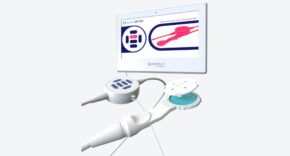
Data Kinetic, a technology company focusing on Applied AI for industry, has launched its first suite of industry-focused applications, designed to work with existing healthcare workflows and solutions.
With the solution suite, healthcare specialists can run models on their preferred platforms, and leverage air-gapped security ensuring models are isolated for any data leakage. This technology is focused on supporting teams with minimal disruption, which ultimately reduces burnout, optimizes efficiencies alongside patient outcomes, and ensures patient privacy.
These multi-modal models are cold start meaning that no data leaves the customer’s environment, and customers can build their own AI assets while supporting existing workflows and practice requirements. This ensures that patient data is kept secure and that healthcare organizations can have complete control of their AI.
Applied AI applications have already revolutionized various operations for many enterprises, offering numerous benefits such as increased efficiency, cost savings, and improved decision-making. However, most organizations need help to successfully implement and integrate AI into the business landscape with measurable results — Data Kinetic changes this.
“Data Kinetic is driven to make a difference in the healthcare industry by empowering specialists with Applied AI. We collaborate with healthcare teams to improve patient outcomes and drive positive changes. By addressing specific healthcare challenges with AI models, we enhance patient care, drive cost efficiency, and deliver measurable improvements to healthcare operations,” said Nick King, CEO and founder, at Data Kinetic.
Data Kinetic’s Solution Suite for Healthcare
Data Kinetic’s approach drives efficiency by providing engineering teams with the model blueprints and pre-packaged models to reduce cost and increase speed to market while running the latest algorithms securely in the preferred environment. Key solutions include:
- Social Determinants of Health (SDH): The SDH application focuses on the impact of non-medical factors like lifestyle and socioeconomic status, which account for 30-55% of health outcomes. By training machine learning models on data sets that include income, healthcare, education, and other factors, we predict vaccination rates, and other community health indicators and offer insights into the factors impacting these rates.
- Hospital Patient Volume Forecasting: Using historical patient records, admission and discharge data, and real-time data streams to predict patient volumes with advanced AI. This application is vital in optimizing resource allocation, care plan adjustments, and emergency preparedness.
- Hospital Length of Stay Prediction and Staffing Optimization: Accurate prediction of hospital stay lengths is essential for optimizing resource utilization and reducing healthcare costs. Our solution combines 17 regime factors, including correlated conditions, historical data, and CMS insights.
- Detecting Adverse Drug Impacts from Social Media Conversations: Given that side effects of medicines and vaccines may emerge in larger and more diverse patient populations, our AI and Data Analytics application provides near real-time insights into drug safety monitoring.
- Medical Supply Chain: Understanding the complexity of today’s global supply chains, our AI application enhances efficiency and accuracy in demand forecasting. This involves hierarchical clustering on time series correlations and employs diverse models like XGBoost and Neural Networks for varied conditions and programs.
- CMS Fraud Detection: Data Kinetic’s CMS Fraud Detection system has been developed using over 480 models and 9 graph variations, creating a comprehensive statistical model with over 4,000 parameters. This model, deployed within the healthcare provider’s infrastructure, demonstrates a high accuracy rate of 94% in detecting fraudulent behaviours.
An industry-first platform-agnostic approach to applied AI
One of Data Kinetic’s critical differentiators in the applied AI space is its platform-agnostic approach, which allows organizations to build on their investments and move within trusted systems to achieve desired AI outcomes. This is particularly impactful for complex industries like healthcare, where fine-tuning technology to meet the needs of patient use cases is essential.











